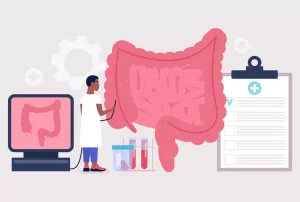Colorectal Cancer: Common Symptoms and Warning Signs
Colorectal cancer is a serious health concern that affects millions of people worldwide. As the third most common cancer in the United States, it’s crucial that you understand the warning signs and symptoms. Early detection can significantly improve treatment outcomes and survival rates. While colorectal cancer often develops without noticeable symptoms in its early stages, there are several key indicators you should be aware of. By familiarizing yourself with these warning signs and discussing any concerns with your healthcare provider, you can take proactive steps to protect your health. This article will explore the common symptoms and warning signs of colorectal cancer, empowering you with knowledge to advocate for your well-being.
Overview of Colorectal Cancer
Colorectal cancer is a serious condition that affects the large intestine (colon) and rectum. It typically begins as small, noncancerous growths called polyps that can develop into cancer over time. According to the Mayo Clinic, common colorectal cancer symptoms include changes in bowel habits, rectal bleeding, and abdominal discomfort. Early cancer screening and detection in Singapore and worldwide are crucial, as localized colon cancer has a 90% 5-year survival rate. Regular screenings, such as colonoscopies, are recommended for adults starting at age 45 to identify and remove potential precancerous polyps, significantly reducing the risk of developing this form of cancer.
Symptoms and Causes of Colorectal Cancer
Common Warning Signs
Colorectal cancer symptoms often develop gradually and may not be noticeable initially. Key signs include persistent changes in bowel habits, rectal bleeding, abdominal discomfort, and unexplained weight loss. Early detection of these symptoms is crucial for timely intervention.
Risk Factors and Causes
While the exact cause remains unknown, certain factors increase your risk. These include age, family history, inflammatory bowel diseases, and lifestyle choices like a low-fiber diet and physical inactivity. Regular cancer screening in Singapore and other countries is vital for early detection, as colon cancer signs may not be apparent in the early stages.
When to See a Doctor: Symptoms of Colorectal Cancer
If you experience persistent changes in bowel habits or notice blood in your stool, it’s crucial to seek medical attention promptly. These symptoms could be early signs of colorectal cancer, especially if they last for more than two weeks. Other warning signs include unexplained weight loss, fatigue, and abdominal discomfort. Don’t hesitate to consult a healthcare professional, even if you’re young, as colon cancer detection in Singapore and worldwide is increasingly occurring in adults under 50. Regular cancer screening is vital for early detection, which significantly improves treatment outcomes. Remember, being proactive about your health can make all the difference in identifying and addressing potential colon cancer signs early.
Risk Factors and Prevention of Colorectal Cancer
Understanding Risk Factors
Several factors can increase your risk of developing colorectal cancer. Age is a significant factor, with rates rising among adults under 50. Other risk factors include family history, inflammatory bowel disease, obesity, and unhealthy lifestyle choices. Regular cancer screening is crucial for early detection, as colorectal cancer often develops without symptoms.
Prevention Strategies
Adopting a healthy lifestyle can significantly reduce your risk of colorectal cancer. Maintain a diet rich in fiber, fruits, and vegetables while limiting processed meats. Regular physical activity and maintaining a healthy weight are also essential. For early detection, follow recommended screening guidelines, starting at age 45 for average-risk individuals. Remember, colorectal cancer symptoms and bowel cancer detection methods should be discussed with your healthcare provider for personalized advice on cancer early detection in Singapore.
Diagnosis and Tests for Colorectal Cancer
When it comes to cancer early detection, Singapore and other countries emphasize the importance of timely screening. If you experience colorectal cancer symptoms, your doctor may recommend several tests. A colonoscopy is the primary method for bowel cancer detection, allowing visualization of the entire colon. Other colon cancer signs, such as blood in stool, may be detected through fecal occult blood tests. Additional diagnostic tools include CT scans, MRIs, and blood tests to check for tumor markers. Regular cancer screening, starting at age 45 for average-risk individuals, is crucial for early detection and improved treatment outcomes.
Treatment Options for Colorectal Cancer
Treatment for colorectal cancer depends on the stage and location of the disease. Early detection through cancer screening is crucial for better outcomes. For localized tumors, surgery is often the primary approach, sometimes followed by chemotherapy. Advanced cases may require a combination of treatments, including chemotherapy, radiation, and targeted therapies. Immunotherapy is a promising new option for some patients. Regular follow-up care is essential to monitor for recurrence and manage any lingering colon cancer signs. Always consult with a specialist to determine the best treatment plan for your specific case of colorectal cancer symptoms.
Conclusion
As you’ve learned, being aware of the common symptoms and warning signs of colorectal cancer is crucial for early detection and successful treatment. By staying vigilant and paying attention to changes in your bowel habits, unexplained weight loss, or persistent abdominal discomfort, you can take proactive steps to protect your health. Remember, these symptoms don’t necessarily indicate cancer, but they warrant prompt medical attention. Regular screenings are equally important, especially if you’re over 45 or have risk factors. By prioritizing your digestive health and maintaining open communication with your healthcare provider, you can significantly improve your chances of preventing or detecting colorectal cancer in its early stages. Your health is in your hands – stay informed and take action when necessary.
Disclaimer: The content for this article is for informational purposes only and is not a substitute for professional medical advice, diagnosis, or treatment. Always consult your oncologist with any questions regarding a medical condition. Do not disregard medical advice or delay seeking it based on information from this site.

